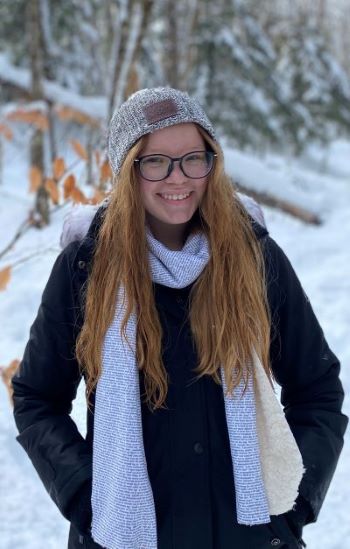
Ella Uren
- Expert Role: Rookie
- Major: Human Biology
- Class: Graduate Student
- Hometown: Negaunee, Michigan
Why is this humanitarian work important to you?
The migrant crisis has always been something I’ve heard about in the news and in class discussions, and the gravity of the situation can make you feel helpless, especially when you live on the other side of the country. Having the opportunity to use my own privilege and knowledge to assist and help bring closure to many families affected by this crisis is an indispensable experience. In a situation when these migrants have been forced into a long difficult journey and stripped of their rights, I hope by participating in Beyond Borders I can at least help in some way.
What do you hope to gain from this experience?
I hope I will learn more about field work and get to experience some of the things forensic anthropologists do outside of the university environment. I also hope to gain a better understanding of the socio-political situation along the border and be able to bring that insight back to Indiana and help bring awareness to this issue. Although I know we will only be in Texas for a short time, I hope what we do will help someone in a positive way and we can leave knowing someone affected by this crisis is better off because of our work.
What are some of the biggest challenges you will face while in Texas?
I think both the physical and emotional toll will be the biggest challenges for me in Texas. Working with the families and friends of those who are missing will be extremely difficult knowing that the policies that push migrants into a position where they are alone in an unknown land are slow to change, and rarely change for the positive. It will be a challenge to face this crisis for the first time outside of classroom discussion and readings. In addition to this, being from northern Michigan the natural environment will be extremely different from what I’m used to, especially during the winter months, so adjusting to the weather will be a big challenge.
What’s one thing people probably don’t know about you until they’ve known you a long time?
I can play three instruments!
When did you know you wanted to pursue human biology as a degree, and how did you become interested in forensics?
Growing up I was always interested in science and the body. I was introduced to forensic anthropology when my sister took an intro anthropology class in college and suggested I would find it interesting. I ended up changing my major in undergrad to anthropology and since then I have found the biological aspect of anthropology really fascinating. I then had a professor in undergrad suggest UIndy’s program to me. The human biology program allows me to pursue forensic anthropology and be taught by professors who are incredibly knowledgeable in the field. Having a stronger science and anatomy background will help me as I pursue a PhD to be a more complete student and stand out from my competitors.
What advice would you give other students interested in pursuing a human biology degree at UIndy?
Get involved! There are so many exciting opportunities both in the classroom and in the community that are available to you at UIndy that can help you stand out when you graduate. By talking with your professors and getting to know them they can help direct you from positions of expertise in the field.
What makes UIndy’s human biology program distinctive?
The human biology program is distinctive because it incorporates more science into forensic anthropology than many other programs do. Getting your master’s at UIndy makes you a more well-rounded anthropologist as the scientific foundation helps fill in the gaps for students coming from an anthropological background.